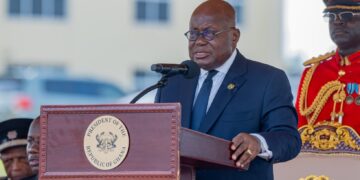In the midst of a worsening crisis caused by rising costs of living, Nigeria’s president unveiled his first budget since taking office.
He declared that in the upcoming fiscal year, the government would spend 27.5 trillion naira ($34.85 billion; £27 billion).
The plans would draw investment, according to Bola Ahmed Tinubu, providing “renewed hope” in lean economic times.
After an aggressive package of reform measures, inflation surged, prompting Mr Tinubu to urge patience.
Upon winning contentious elections in May with 37% of the vote, he stunned many Nigerians during his inaugural speech by abruptly ending a decades-old fuel subsidy.
Many saw their cost of living crisis worsen as a result of the move, which caused a sharp increase in the price of fuel and other goods.
In addition, Mr Tinubu abolished foreign exchange controls, which helped drive inflation to a 25 percent peak—the highest it has been in almost 20 years.
The depreciation of the naira led to a rise in import expenses and complicated repayment of foreign loans.
Mr. Tinubu, however, stood by his choice, claiming that the fuel subsidy had shown to be “harmful” to the national economy.
He has repeatedly urged patience, stating that the budget’s effects on the cost of living crisis will only last temporarily and that the actions will ultimately benefit the nation and draw in more foreign investment.
According to Mr. Tinubu, his “Budget of Renewed Hope” would guarantee macroeconomic stability, spur growth that would create “job-rich” jobs, and lower the deficit.
He said that enhancing infrastructure and security was a top priority for the government, along with finding ways to alleviate the crisis caused by inflation.
According to Mr. Tinubu, increased tax revenue and oil production would increase government revenues and reduce the need for borrowing by his administration.
In addition, he stated that inflation would likely reach 21.4% and the economy would expand by at least 3.76% in 2024.
Official statistics show that it increased from 26.72% in September to 27.3% in October.
Due to the economic downturn, many young professionals in Nigeria have left the country in large numbers, many of them are unemployed.
Members of parliament must approve the budget before it can be implemented.














